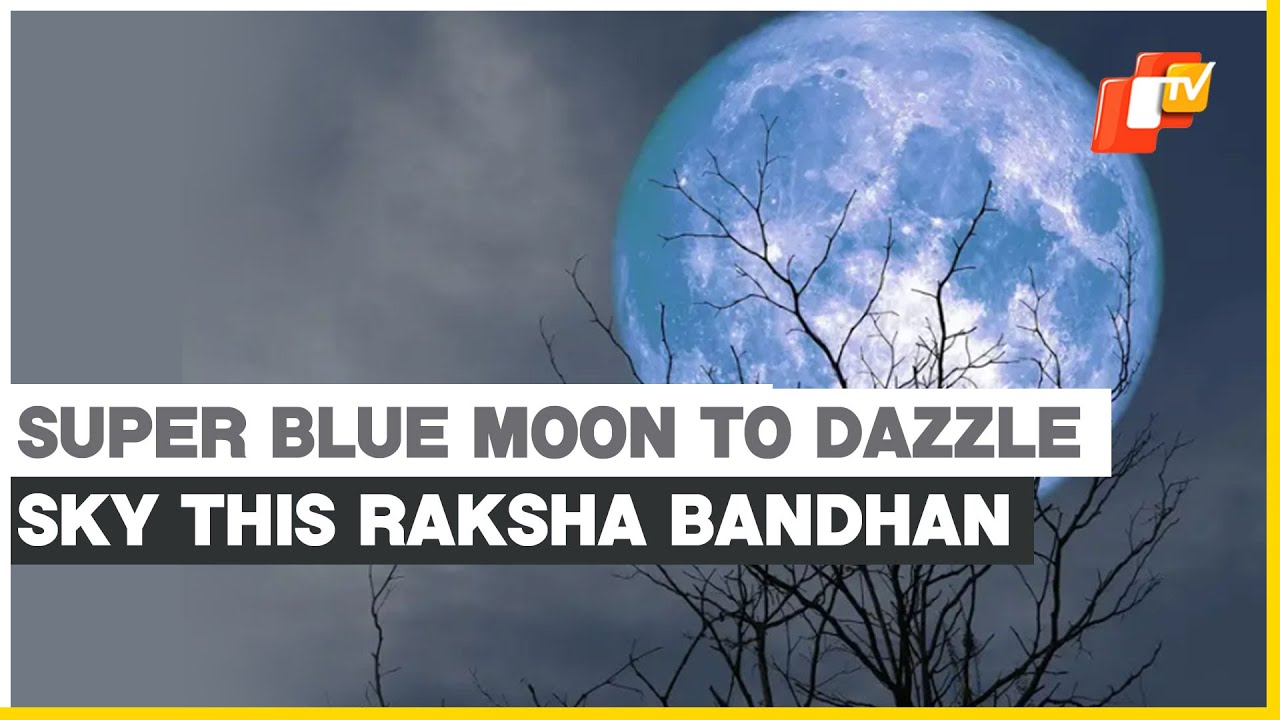


On August 19th, Raksha Bandhan or Rakhi will coincide with the sighting of a rare astronomical phenomenon known as the "Super Blue Moon." This unique event is a combination of a blue moon, a super moon, and the holiday of Rakhi, making it a trifecta of celestial events. Get ready for this rare sight and learn more about why it happens and where you can witness it.
The Rare Convergence of a Super Blue Moon and Raksha Bandhan
On August 19th, the celestial realm will witness an extraordinary phenomenon as a "Super Blue Moon" coincides with the auspicious Hindu festival of Raksha Bandhan. This unique occurrence marks the convergence of three celestial events: a blue moon, a supermoon, and the holiday celebrating the bond between siblings.
Background on the Blue Moon
A blue moon is a term used to describe the second full moon within a single calendar month. This happens approximately once every two and a half years. The name "Blue Moon" originates from a misinterpretation of the phrase "belewe moon," which referred to the third full moon in a season that typically only has three.
Background on the Supermoon
A supermoon occurs when the full moon aligns with the Earth's perigee, the closest point in its orbit around our planet. This makes the moon appear larger and brighter than usual.
Convergence with Raksha Bandhan
Raksha Bandhan is a Hindu festival celebrated on the full moon of the month of Shravana (July-August). It symbolizes the love and bond between brothers and sisters. On this day, sisters tie a sacred thread called a "rakhi" around their brother's wrists, and brothers vow to protect and care for their sisters.
The Significance of the Blue Moon, Supermoon, and Raksha Bandhan
The convergence of these three celestial events is a rare and auspicious occasion. In many cultures, blue moons and supermoons are associated with change, growth, and transformation. The combination with Raksha Bandhan, which celebrates familial bonds, adds a layer of symbolism to the event, representing the strengthening of sibling relationships and the renewal of commitments.
Top 5 FAQs
Why is this event considered rare? It is rare for a blue moon and a supermoon to coincide on the same day. Adding Raksha Bandhan to the mix makes this event even more unique.
Where can I witness the Super Blue Moon? The Super Blue Moon will be visible from anywhere on Earth where the skies are clear.
What time will it occur? The exact timing of the full moon will vary slightly depending on your location. However, it will generally be visible in the evening and night of August 19th.
What does the Super Blue Moon symbolize? Different cultures have varying interpretations of blue moons and supermoons. However, they are often associated with change, growth, and reflection.
Has this event occurred in the past? Yes, the last time a blue moon, supermoon, and Raksha Bandhan coincided was on August 29, 1982. The next time it will occur is on August 31, 2037.

On the birth anniversary of Dr. APJ Abdul Kalam, the ‘Missile Man’ of India, tributes pour in on social media celebrating his life, vision and impact. A visionary scientist, inspiring leader and true patriot, Dr. Kalam's humility, compassion and constant interaction with students continue to inspire generations. His tireless efforts in defense, science and youth empowerment have strengthened India's path towards self-reliance and his legacy continues to motivate young minds to dream big and work hard for the nation.

Recent studies have found that extreme heat, particularly when combined with high humidity, can have a significant impact on mental health. A study in India showed that when wet bulb temperature exceeded 27°C, the probability of reporting severe depression increased by 0.5%, even when the temperature was slightly lower. This finding is consistent with global reviews that have linked high temperatures to mood disorders, increased hospital admissions for psychiatric conditions, and even elevated suicide risk. The Lancet has also published evidence that rising temperatures worldwide are a growing threat to emotional and cognitive health.

In a meeting with university officials in Udaipur, Rajasthan Governor Hari Bhau Bagde stressed the importance of incorporating India's ancient knowledge traditions into academic research. He highlighted the deep repository of knowledge in India since ancient times and urged scholars and scientists to draw upon this tradition in their work. Bagde also suggested making ancient texts available in university libraries for study and research purposes, in order to shape the intellectual abilities and love for the nation among the younger generation.

John Clarke, Michel H. Devoret, and John M. Martinis have been awarded the 2025 Nobel Prize in Physics for their pioneering research into quantum mechanical tunnelling. Their discovery has opened new possibilities for quantum technologies, and will be formally presented on December 10, the anniversary of Alfred Nobel's death. This announcement follows the tradition of recognizing transformative contributions to science, and the award carries a prestigious prize of 11 million Swedish kronor.

The US-Japanese trio of Mary E Brunkow, Fred Ramsdell, and Shimon Sakaguchi have won the 2025 Nobel Prize in physiology or medicine “for their discoveries concerning peripheral immune tolerance". Through their research, they have shown how the immune system is kept in check and why serious autoimmune diseases do not affect everyone. Sakaguchi found a new class of T cells, while Brunkow and Ramsdell discovered the explanation behind a specific mouse strain's vulnerability to autoimmune diseases. Together, they have significantly advanced our understanding of immunology and autoimmune diseases.

Indian astronaut Shubhanshu Shukla, who recently completed a 20-day space mission, shared his insights and experiences at the convocation ceremony of Dr. APJ Abdul Kalam Technical University. He highlighted the importance of patience, focus, and the inevitability of change in achieving success, and urged the graduating class to actively contribute to shaping a fearless and ambitious India.

The Regional Meteorological Centre (RMC) in Chennai has issued a weather alert for parts of Tamil Nadu, with thunderstorms and light to moderate rainfall expected on Saturday. The alert was issued due to the strengthening of a cyclonic circulation in the Bay of Bengal, which is likely to intensify and form a low-pressure area. The system is expected to affect Tamil Nadu, Puducherry, and Karaikal, with some areas experiencing heavy rainfall and gusty winds. The public is advised to stay updated and take precautions, especially in hilly and western districts.

As a step towards advancing India's deep-sea research capabilities, the Union Science Minister announced a landmark contract with the International Seabed Authority to conduct mineral exploration in the Indian Ocean for the next 15 years. This move will not only help India in expanding its scientific knowledge about the deep sea but also has the potential to strengthen its position as a leading player in the international seabed mining industry.

President Trump has signed a proclamation that makes significant changes to the H-1B visa program. These changes include a new $100,000 fee for employers to sponsor H-1B workers entering the US, as well as higher wage levels and priority for senior, high-paying positions. While workers currently inside the US on valid H-1B status are not directly affected, anyone traveling abroad and seeking re-entry must comply with the new requirements. The lasting impact on the flow of talent, technology, and jobs between India and the US remains uncertain.

On September 7, 2025, a total lunar eclipse, known as a "Blood Moon," was visible to sky-watchers across Europe, Africa, Asia, and Australia. This event, which lasted from 8:58 pm to 2:25 am in India, is the longest total lunar eclipse since 2022 and only the second clearly visible Blood Moon in India since 2018. The Moon appeared red due to the Earth's atmosphere bending sunlight and filtering out blue light, providing ideal viewing conditions for Indian observers in the late evening and early hours of September 8.